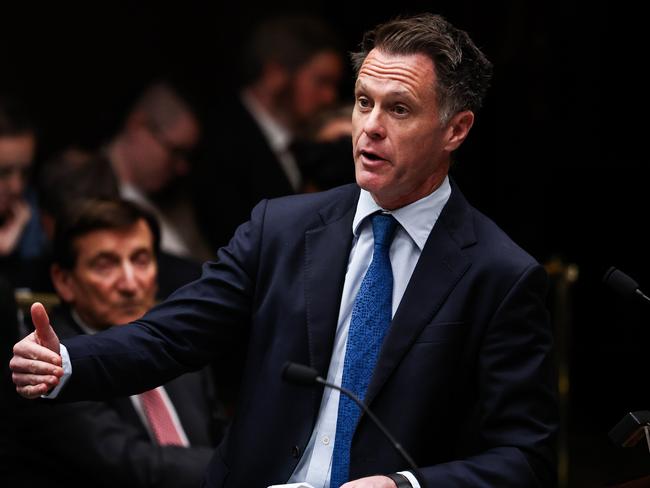James O’Doherty: Failed Rosehill sale a body blow for Premier’s housing reform
Chris Minns took a gamble on the sale of Rosehill Racecourse, but lost his shirt. Unfortunately, the people of NSW have lost, too, writes James O’Doherty.
Opinion
Don't miss out on the headlines from Opinion. Followed categories will be added to My News.
Chris Minns bet it all on a roughie, hoping to win big – but ended up losing his shirt.
With ATC members voting down the sale of Rosehill Racecourse to build 25,000 new homes supported by a new Metro station, the people of NSW have lost out too.
But there is no bigger loser than ATC boss Peter McGauran, who oversaw a deal-botching masterclass.
It takes a special kind of talent to offer a community a $5 billion war chest and massive asset upgrades in exchange for a property that the race-going public shows little affection for, only to lose – dragging the organisation through a bitter war of personalities along the way.
When the Premier stood alongside McGauran to announce the proposal to sell Rosehill Gardens for a 25,000-home development, the plan was presented as a fait accompli.
Minns declared he was “very confident” it would happen and McGauran acted as if the decision was already made.
There was not a single mention of the fact that he would have to win over his members to get the deal done.

As a former politician, McGauran should have known the importance of doing the numbers.
The ATC would argue strict NDAs prevented them from getting members on board earlier, but failing to win over legendary trainers – including Chris Waller – before going public was an error that proved fatal.
The ATC’s campaign proved too timid in the face of a “Save Rosehill” campaign whose arguments strayed into fallacy.
The claim from training legend Peter Snowden, for instance, that Rosehill would be worth “double” the $5 billion on offer, failed to consider that the vast majority of that money was contingent on a new Metro station that could only be built once.
Rosehill attendances have also tanked; crowds have fallen 50 per cent in 10 years, and almost 70 per cent of ATC members have not attended Rosehill this season.
Racing’s first lady Gai Waterhouse has not been to a Rosehill meeting since before Covid.
Perhaps that is why she told radio that Tuesday’s vote was a win for the people of Liverpool – some 20km away.

As for Minns, the Premier’s initial advocacy for the project should be applauded but, when he started to see the writing on the wall, he backed away at a million miles an hour.
If Minns really believes Rosehill is key to ending the housing crisis, he could spend some of his vast political capital on compulsory acquisition.
That, he says, is impossible – it would simply be too expensive.
Even at the start, some close to Minns were wary of the ambitious development ever getting off the ground. That was before campaigners against the sale really mobilised.
Minns does not see the “no” vote as a personal defeat, but he cannot escape this loss — this was a proposal he championed and planned for.
His bureaucrats even put other projects on hold while the whole fiasco played out.
It is not quite a “humiliation”, as Liberal leader Mark Speakman says, but the Premier – whose only reason for being is fixing the housing crisis – has copped a body blow.
With his one big idea to put a meaningful dent in the housing crisis scratched, the Premier has been left scrambling without a backup plan.
Minns says his government started thinking about alternatives weeks ago, when it became clear ATC members would vote down the sale.
But don’t expect any announcements any time soon – even in next month’s budget – because nothing has been nailed down.
After jumping the gun on announcing the Rosehill plan before it was locked in, Minns is being cautious not to go out too early on highly commercially-sensitive plans.
If there is any silver lining, it is that the government now feels emboldened to fight NIMBYs when it comes to reshaping Sydney.
Government sources argue that it was the debate about Rosehill which “catalysed” the argument for higher density housing – and the government’s role in delivering it.
“(The) Rosehill (debate) has persuaded the government that there needs to be intervention,” one says.

Planning reforms have so far been tinkering around the edges. The three-person Housing Delivery Authority allowing major projects to bypass the snakes-and-ladders planning system is a good start, as is Property Minister Steve Kamper’s audit looking for unused land which the government can flog off.
But if Minns really wants to get housing going, he should fix the underlying problem: Developers just cannot afford to build.
The things really standing in the way of new housing are the costs on new developments, including developer levies to pay for infrastructure and strict national building codes.
Reducing taxes and charges on new buildings will let developers start constructing the new homes we need to fix the supply crisis.
And that is a sure bet.
Do you have a story for The Daily Telegraph? Message 0481 056 618 or email tips@dailytelegraph.com.au



